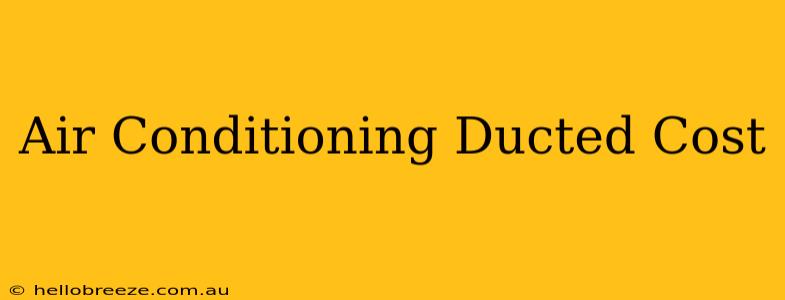Thinking about installing a ducted air conditioning system? It's a significant investment, so understanding the ducted air conditioning cost is crucial. This guide breaks down the various factors influencing the price, helping you budget effectively and make an informed decision.
Factors Affecting Ducted Air Conditioning Costs
Several key factors contribute to the overall cost of ducted air conditioning. Let's explore them in detail:
1. System Size and Capacity
The size of your home and the desired cooling capacity directly impact the cost. Larger homes naturally require larger, more powerful systems, leading to a higher price tag. Accurate load calculations are essential to determine the appropriate system size, preventing overspending or underperformance.
2. Type of System
Different types of ducted air conditioners exist, each with varying price points. Reverse cycle systems (heating and cooling) are generally more expensive upfront but offer year-round comfort and energy efficiency. Consider your climate and energy needs when choosing a system.
3. Brand and Model
The brand and model of your ducted air conditioner significantly influence the price. Established brands often come with a higher price tag, reflecting their reputation for quality, reliability, and advanced features. However, carefully researching less-known brands can offer cost savings without sacrificing performance.
4. Installation Complexity
The complexity of the installation process is a major cost driver. Factors like the layout of your home, the location of existing ductwork (if any), and the need for additional ductwork all affect the installation time and labor costs. Difficult installations in multi-story homes or homes with complex layouts will increase the overall cost.
5. Location and Labor Costs
Geographic location influences the overall ducted air conditioning cost. Labor rates vary significantly by region. Areas with high demand for HVAC services may have higher labor costs compared to less populated areas.
6. Additional Features
Upgrading to advanced features such as smart home integration, zoning capabilities, and enhanced filtration systems adds to the initial cost of installation. While these features might boost comfort and efficiency in the long run, consider their value based on your individual needs and budget.
Estimating the Ducted Air Conditioning Cost
While providing an exact figure is impossible without a professional assessment, you can expect the cost of a ducted air conditioning system to range from several thousand to tens of thousands of dollars. It's vital to obtain multiple quotes from reputable installers to compare pricing and services.
Tips for Saving Money on Ducted Air Conditioning
- Shop around: Obtain quotes from at least three different installers.
- Consider energy-efficient models: These might cost more upfront but offer long-term savings.
- Explore financing options: Some installers offer financing plans to help manage the cost.
- Take advantage of rebates and incentives: Check for government rebates or utility company incentives.
- Time your installation strategically: Off-season installations might offer better deals.
Conclusion
The cost of ducted air conditioning is a significant investment, but the long-term comfort and improved energy efficiency can make it worthwhile. Thorough research, careful planning, and comparing quotes from multiple reputable installers are key to making an informed decision and staying within your budget. Remember to factor in all the elements mentioned above for a realistic cost estimate. Don't hesitate to ask installers detailed questions to ensure you fully understand what's included in the quote.

